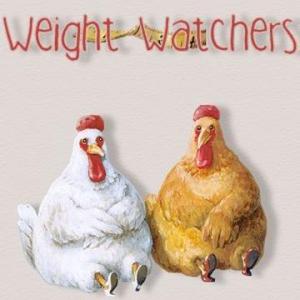What….Weight Watchers?
 Woody Allen’s essay in The Insanity Defense, “Notes from the Overfed” made me think of all of the reasons people eat. His combined readings of Dostoevsky and the Weight Watchers magazine created a philosophical look at being overweight, which I do not believe Allen has ever been. His insight into the world of fat is comical yet introspective. The relationship people have with food and their own fat sometimes appear to border on religious. As I venture further into reading Crime and Punishment, there are passages that stand out of questioning the meaning of life and questioning God’s presence. Raskolnikov mocks Sonya’s belief in God and her faith that He will provide her with what she needs to survive. In Allen’s essay, he writes about a conversation between himself and an uncle in which the Uncle proposes a question about how much He weighs. There is an obvious connection between the two readings and the essay, if in fact, Allen was actually reading those when this essay came to him.
Woody Allen’s essay in The Insanity Defense, “Notes from the Overfed” made me think of all of the reasons people eat. His combined readings of Dostoevsky and the Weight Watchers magazine created a philosophical look at being overweight, which I do not believe Allen has ever been. His insight into the world of fat is comical yet introspective. The relationship people have with food and their own fat sometimes appear to border on religious. As I venture further into reading Crime and Punishment, there are passages that stand out of questioning the meaning of life and questioning God’s presence. Raskolnikov mocks Sonya’s belief in God and her faith that He will provide her with what she needs to survive. In Allen’s essay, he writes about a conversation between himself and an uncle in which the Uncle proposes a question about how much He weighs. There is an obvious connection between the two readings and the essay, if in fact, Allen was actually reading those when this essay came to him.
As we discussed class, Raskolnikov represents the modern man, one who is wholly in pursuit of one’s own self-interest, expressing a lack of belief in a higher power whom could judge his actions. In this light, a reader can assume that the idea of one’s God being in food and consuming that food as an act of religion would therefore mean that one is trying to be what he eats, being God. Also, Weight Watchers is supposed to give an over-eater the tools to resist the cravings and turn away from their old habits, which completely goes against the rational egoist train of thought.
In short, in reading Dostoevsky, and then reading this Allen’s piece, the influence of the themes in Crime and Punishment are more apparent. Thus, in reading the literature that has influenced Woody Allen, it gives his audience a better understanding of him.
